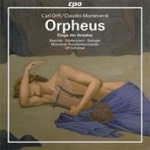This strange bird is worth hearing. While the last 35-or-so years have been involved with discovering–through research and guesswork–how early music actually sounded, this is a reminder of a time when early music had somehow lost its relevance. In the 1920s Carl Orff, in an attempt to rejuvenate or revalidate Monteverdi, took the composer’s Orfeo, had it translated into German, eliminated some “extraneous” scenes, and re-orchestrated it. He continued to fiddle with it, and what is recorded here is the version he completed in 1940. It will be blasphemy to many, but as I stated above, it’s worth hearing.
Precisely how radical are the cuts can be seen by the playing time–just over an hour. Orff cut half the solo roles (shepherds, etc.), the whole final act, and much of the Underworld scenes; in addition, he has re-ordered some of the music. Harmonically it is most daring–not “daring” à la Schoenberg, but “daring” as a piece of very-late Romantic music. The orchestra plays the way you would expect Haydn symphonies to have been performed in the 1940s; the tone is lush. Conductor Ulf Schirmer does not overdo it–if he had chosen, he could have opted for even more vibrato. He treats the music like Orff rather than Monteverdi, and that strikes me as absolutely right.
The orchestra and chorus are excellent; Orff’s decision to orchestrate adding prominent harps and lutes (here recorded very vividly) is a bow to the 17th century, though not a very deep one. Kay Stiefermann is a fine Orpheus, singing expressively, with dark, handsome tone, if not with the absolute involvement that Hermann Prey brings to the role in a 1972 ARTS release (reviewed by David Hurwitz–type Q7833 in Search Reviews). Janina Baechle’s dark mezzo is remarkable as the Messenger, and she is just as impressive in Ariadne’s Lament, which fills out the last 12 minutes of the disc–also in Orff’s arrangement. Michaela Selinger, another mezzo, brings pathos to the role of Eurydike.
This was recorded live in Germany in 2010 and the sound is excellent. The audience, obviously bound and gagged, intrudes with applause only at the end of each piece. Because of the extra filler (the Klage der Ariadne) and superior sound, I’ll vote this the first choice, but Hermann Prey and Lucia Popp are mighty impressive on the ARTS release as well. In its own way, this is a stunning piece of music. CPO supplies track listings and interesting essays–but grievously, no libretto or translation. [12/5/2011]
































